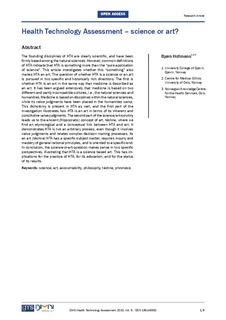| dc.description.abstract | The founding disciplines of HTA are clearly scientific, and have been firmly based among the natural sciences. However, common definitions of HTA indicate that HTA is something more than the “pure application of science”. This article investigates whether this “something” also makes HTA an art. The question of whether HTA is a science or an art is pursued in two specific and historically rich directions. The first is whether HTA is an art in the same way that medicine is described as an art. It has been argued extensively that medicine is based on two different and partly incompatible cultures, i.e., the natural sciences and humanities. Medicine is based on disciplines within the natural sciences, while its value judgments have been placed in the humanities camp. This dichotomy is present in HTA as well, and the first part of the investigation illustrates how HTA is an art in terms of its inherent and constitutive value-judgments. The second part of the science/art-scrutiny leads us to the ancient (Hippocratic) concept of art, téchne, where we find an etymological and a conceptual link between HTA and art. It demonstrates HTA is not an arbitrary process, even though it involves value judgments and relates complex decision making processes. As an art (téchne) HTA has a specific subject matter, requires inquiry and mastery of general rational principles, and is oriented to a specific end. In conclusion, the science-or-art-question makes sense in two specific perspectives, illustrating that HTA is a science based art. This has implications for the practice of HTA, for its education, and for the status of its results. | |
